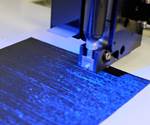Multi-walled carbon nanotubes available in three forms
Goodfellow’s multi-walled carbon nanotubes are available as regular powder, “chunky” powder or free-standing “carpets.”
Goodfellow’s (Coraopolis, Pa., U.S.) multi-walled carbon nanotubes (MWCNTs) are available in three different forms: regular powder, “chunky” powder and free-standing “carpets.” All three forms are produced by means of a catalytic chemical vapor deposition (CCVD) process.
Regular powder is available in research quantities of several grams up to economical mass production quantities of several kilos.
What the company calls “chunky” powder, exclusive to Goodfellow, is said to be safer and easily dispersed via sonication into a polymer matrix. It is available in small quantities for research.
Free-standing, vertically aligned MWCNTs arrays, called “carpets” or “forests” — also exclusive to Goodfellow — are distinguished by their anisotropic properties. According to the company, current research revolves around potential uses as free-standing membranes and filters, thermal interface materials, in electronic devices and supercapacitors, and by embedding them in polymer matrices for the production of innovative composites. MWCNTs “carpets” are available in small quantities for research.
Carbon nanotubes are tube-shaped materials composed of carbon atoms covalently bonded in hexagonal network, having a nanometric diameter. As an additive in composites, they can improve the mechanical, thermal or electrical properties of a material, offering benefits such as high electrical conductivity, good processability, flame retardancy, thermal dissipation, UV resistance and more. Industries where these attributes are especially beneficial include aerospace, automotive, electronics, energy, oil and gas, coatings and sporting goods.
Related Content
-
Wichita State researchers build composites strength, functionality with helical CNTs
Patent-pending chemically functionalizing helical carbon nanotubes (HCNTs) produce scalable nanocomposites that reduce weak interlaminar bonding, improve bonding, support repair and healing and more.
-
AMD to open U.S. subsidiary for defense, aerospace nanotechnology
AMD Inc., based in Austin, Texas, has a broad license to all parent company IP and will continue to invest in R&D projects with the group’s existing university partners.
-
Arceon, Goodman Technologies to progress melt-infiltrated CMC
U.S. aerospace and defense markets are expected to benefit from Arceon’s expertise in C/C-Sic materials and Goodman’s presence in the nanocomposites ecosystem.
.jpg;width=70;height=70;mode=crop)





